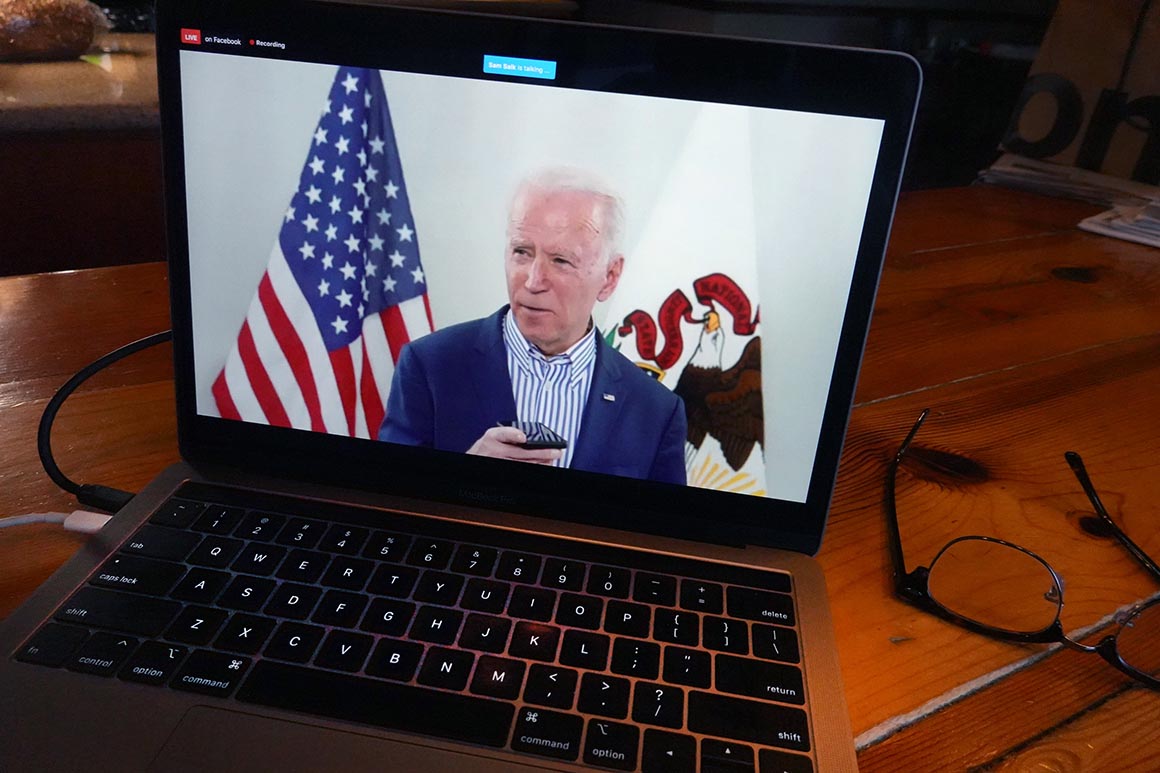
One recent Biden invitation advertised a “pre-event VIP clutch” — a small group of donors who would get a few minutes with the former vice president ahead of a larger fundraiser — mimicking in-person, private receptions. The cost of virtual admission to the more exclusive segment was $25,000.
“Instead of getting your professionally taken photograph of your arm around the candidate, now you have a screenshot or an Insta-friendly video of your Zoom with you two on a split screen,” said Alex Halpern Levy, a Democratic bundler and consultant.
Biden is also tapping his celebrity connections as draws: One star-studded virtual fundraiser last week included performances from Melissa Etheridge and Kristin Chenoweth, who performed a Biden-themed version of “Popular” from the musical „Wicked.” That event brought in more than $1.1 million, among his campaign’s biggest single-event hauls, according to an aide.
Candidates are feeling real urgency to pull in campaign dollars. Dan Eberhart, a major Republican donor, said there’s “no question” that fundraising will drop in the second quarter of the year. A POLITICO analysis of recent Federal Elections Commission filings found that large contributions to House campaigns dropped significantly at the end of March.
The candidates most at risk are those who typically rely on traditional, in-person events rather than small-dollar online donations to fund their campaigns.
“It’s much easier if you’re already used to doing fundraising online. If your base for your fundraising is actual events, this isn’t good for you,” said Steve Elmendorf, a Democratic donor and top lobbyist. “This crisis accentuates that gap.”
It’s not just Biden asking for big dollars to hobnob with him on your laptop. A Zoom call with Rep. Lacy Clay (D-Mo.) — who’s working to fend off a primary challenge — scheduled for Friday morning asked for PAC contributions of up to $5,000, according to an invitation obtained by POLITICO.
Michael Fraioli, a fundraiser whose firm organized the event, said those figures were only suggested amounts. “Nobody gets turned away,” he said.
Fraioli’s firm has switched over to Zoom fundraisers since holding its last in-person fundraiser — lunch at Bistro Bis, an upscale spot near the Capitol — on March 11. Not everyone who used to show up to Washington fundraisers is interested in attending a virtual one, he said, but more lobbyists are up for it now than they were a few weeks ago.
“None of the lobbyists are rushing to go to a” traditional fundraiser now, Fraioli said. “But they’d like to talk to members of Congress about their industry, their clients, what’s going on.”
Rep. Steven Horsford (D-Nev.) is set to host a “virtual birthday soirée” — who wouldn’t want to spent their birthday talking to donors on a computer screen? — on Friday evening.
The invitation to Cárdenas’ meditation event had a Zen-like tone: “In this time of social distancing, please join Congressman Cardenas in learning mindful best practice,” it reads. The price tag to tune into the universe with him: as little as $250 for individuals or up to $5,000 for those paying with PAC funds.
Gonzalez is holding his wine-tasting fundraiser a few days later. “The virtual event will include a sommelier-guided Texas wine tasting, followed by a conversation with Congressman Gonzalez,” the invitation states. “Your generous contribution includes a set of wines.”
Donors who live near Washington can pick up their wines, while delivery for those who live farther away “is available for an additional charge.” The price tag ranges from $1,000 for individuals to $5,000 for those who pay through PACs at the “PAC Chair” donation level.
While shelling out $5,000 to join a Zoom call might seem over the top, many corporate PACs have preset budgets for donations to lawmakers. The venues where the money gets doled out is less important than ensuring it gets in the right hands.
“Those PACs that are still in a position to make contributions — I think more and more of them are looking for opportunities” to give, said David Reid, a lobbyist who worked as Hillary Clinton’s PAC finance director in 2016.
Still, the pricing for virtual events don’t differ much from in-person events from pre-coronavirus times, several donors said. For many down-ballot candidates, it’s not clear that virtual events will be attractive enough to bring in big money over the long haul.
„Is a Zoom really worth that much?“ said one Democratic donor. „You can do that at the presidential level because it’s the presidential, but that’s really not the case for the House or Senate level.“
Traditional dialing for dollars is still going strong, too. Candidates, in quarantine with plenty of time on their hands, are calling up their biggest donors to check in. Others are opting for one-on-one video chats, too.
„They have the time and we have the time,“ said Bruce Heyman, former ambassador to Canada under President Barack Obama, who said he’s spoken to Democratic challengers such as Cal Cunningham, who’s running against Sen. Thom Tillis in North Carolina, and Sara Gideon, who’s running against Sen. Susan Collins in Maine. „We can have an extended conversation about their race.“
Scott Bland and James Arkin contributed to this report.
Source: politico.com
See more here: news365.stream






